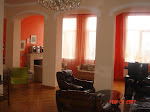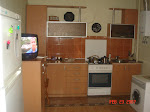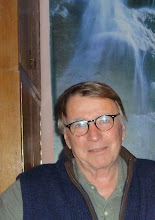Yesterday, April 8th, Georgia really ganged up on these less than inveterate travelers. We were set to head for a national park, Borjomi. Anticipation was high and full of pleasant images. Not to be.
First, it was a cloudy and cold day—not the right kind of weather for a person who suffers circulatory problems. Nonetheless, we were able to get a taxi to take us to the train station. No real problems at this point.
Well, the taxi driver thought it was the train station. We thought it was just a huge Georgian bazaar (open air market) crowded with stalls and vendors everywhere. Set right up in the mud. We had been to this place once with a Fulbrighter and had come on the Metro. But, we had not seen then nor did we see this time any hint that there was a rail station anywhere about. The taxi driver kept insisting that it was over there, down a crowded aisle by the piles of oranges and bananas and sulguni and bags of herbs and nuts. Weaving with our suitcases around the puddles and black garbed shoppers and sellers, we could have been in a short scene from an experimental movie. Black and white.

We found no sign of a train station. The rain had increased in tempo and now a slight wind had come up. We sought a bit of temporary shelter along side the wall of a building which also had a bank office. Sarah went in and finally found a person who spoke some English who could point us to the train station. So, with a very modest degree of renewed hope, we headed for the black cavern that had been indicated as an entrance to the train station.
This black cavern turned out to be just that. It was an opening in the wall of a block like building. Pools of water protected the entrance. It was gloomy and dark inside with no lighting. Water dripped off the ceiling. Once our eyes got used to the light, we noticed people in front of two dimly lit windows to our left. They looked like they could be ticket offices so we went over. These were the ticket offices for the Georgian National Railroad. It took a while to explain to the official that we wanted “ori” tickets to Borjomi. “Ori” = two. But finally she got it. Then using our western logic we decided that the broken cement and stone stairs leading up and out of this cave must be the way to the trains.

Sure enough. Beyond the stairs were two train platforms. A train had pulled into one. And there was the kind of bustle one would see in many parts of the world as people were wheeling carts through the gate and onto the platform—carts full of produce and bags and cases of water bottles.

We didn’t see any chickens or goats but anything could be possible, we think. We learned that the waiting train was one for Kutaisi, one of the country’s larger cities. The Borjomi train was somewhere. There were no signs, no officials, no information booths. Just a cement platform and train tracks and masses of people. So we took it on faith that this train was out there in the country side and would arrive any minute.

By now the rain and wind had increased so we took shelter under the roof over one of the platforms. And waited. Soon a text message came over the mobile phone from Nina the travel agent who had helped us locate a guest house in Borjomi that this train was going to be late and that it would not arrive in Borjomi until after 10 in the evening. This meant that what had been promised to be a two hour trip had become a six hour trip.
We waited indecisively for a bit. But, the more we calculated, the more it seemed that having to spend so much time on a train and so little time at the National Park that we should suppress our anticipation and yield to the difficulties Georgia sometimes presents. We retraced out steps back down the broken stairs, through the dripping black cavern, holding on to each other lest we step in some sort of pothole in the darkness, out to the bazaar.
Then we had to figure out how to return to our apartment on Gogobashvili street. Take a taxi—none visible; take a bus—the bus stop looked like it was way off over a seething mass of vendors and stalls. We remembered the metro and thought, okay, we will do this.
The escalators in Georgia’s metros, as I think I have written, are, to an American eye, exceedingly long and steep. And fast. One stands at the top and looks at this speeding conveyor belt that drops precipitously down a tube into the earth. This produced a moment of frozen panic. But we were able to get on. And we found the right train and took it two stops to the Rustaveli Metro. We had another moment of panic getting onto a similar frightening and fast escalator going up from this stop but finally got that figured out with the help of a courteous young Georgian.
Out on the street with our two pieces of “carry on” luggage, day packs on our backs, we decided we would just walk up to our apartment, wheeling these suitcases over the cobblestone streets and rutted sidwalks.
Our anticipated dinner in a small village in a National Park ended with a couple of paneer meals at an Indian restaurant here in Tbilisi.
This is Sarah being able to interject some reflections. Miles gave an excellent description, but I could ad that I was so psyched to get out of this air polluted, grimey place that I had been in a good mood for two days. When we returned to our place, I again reeked of cigarette smoke, although I had not sat or stood for 6 hours on a dirty, crowded train with flat hard seats and smokers. I was frozen to the bone with blue and white fingers.
I have never seen so many peasants as were at this rail platform. They were right out of eighteenth century small farming villages in long drab skirts, knobby hands, whittling at vegetables to eat while sitting on their plastic bags of vegetables and belongings. Aman in trousers, a peasant cap with three gold teeth sidled up to MIles when he got out his digital camera to snap a few photos. We realized he did not know what this was. MIles took a picture, then showed it to him on the screen. The man smiled and laughed, gesturing to take his picture. Miles obliged, and he was so happy. Through hand signals he told us he is Azerbaijani, and he does not like Tbilisi.

This is the greater part of Tbilisi, not the wide avenue down by Parliament. It all was surrounded by mud, detritus, potholes, and looming nightmares of unfinished multi story Soviet buildings with gaping window openings, roofless.
Ferile dogs are ubiquitous all over the city, and they really pull at my heartstrings as they browse or play with each other. One, whose blond fur was all matted and had a huge wound on it's side and an eye blinded by a huge cataract, smiled at me as we pulled our luggage up the cobblesone hill. I made the mistake of speaking to it and giving it a little petting. This dog glued itself to me and wanted me to play and keep it. I was grateful for a darling sweet dog from our area that appeared to lead my blond buddy into playing.
Plastic bags..I will save this for another telling. They are strewn all over and decorate trees at sacred and profane spots all over. So, I will sign off. Anon








No comments:
Post a Comment